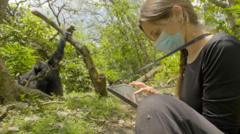In a groundbreaking observation within Uganda's Budongo Forest, scientists from the University of Oxford reported that wild chimpanzees employ natural remedies to heal from injuries, enhancing our understanding of primate health behaviors. The study, published in the journal *Frontiers in Ecology and Evolution*, details how the researchers documented instances of chimpanzees applying medicinal plants to open wounds, both on their bodies and those of their companions. These findings build upon a prior discovery that these intelligent primates self-medicate by selecting specific plants when unwell.
Lead researcher, Elodie Freymann, emphasized that chimpanzees showcase a diverse behavioral repertoire when addressing ailments, often resorting to local flora for treatment. "They can be seen dabbing plants on injuries or chewing the leaves to create a poultice," she noted. Notably, footage revealed a young female chimp tending to an injury on her mother's body, which adds an emotional layer to the behavior by suggesting that non-related chimps also show empathy through reciprocal care.
The research compiled decades of observations—spanning back to the 1990s—from a communal log where local field staff and visitors recorded noteworthy chimpanzee behaviors. Among these were accounts of leaf-dabbing and attempts to remove snares from fellow chimps, coupled with surprising hygiene practices such as leaf use after defecation.
Through their work, Freymann and her team identified various plant species utilized by chimpanzees and confirmed their antibacterial properties. Similar medicinal behaviors have been observed in other great apes, such as orangutans, reinforcing the notion that knowledge of natural medicines is widespread among non-human primates.
"Studying these behaviors prompts a revelation about our limited understanding of the natural world," Freymann remarked. "If I were to exist alone in the forest without provisions, I would likely struggle. In contrast, chimpanzees thrive because of their adeptness in utilizing their environment." The researchers hope that understanding these healing practices could inspire future advances in medicine, highlighting the deep connections between wildlife behavior and the intricacies of survival in the natural world.


















